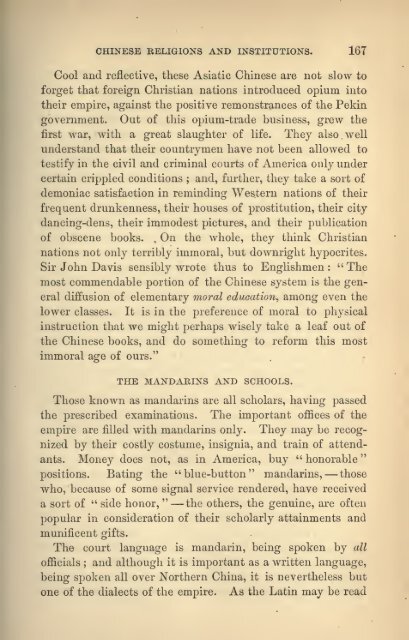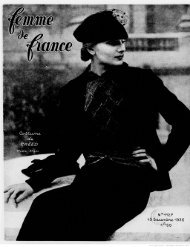- Page 1 and 2:
'•^i ''ki\fs.i^it\} B^ m Heathen
- Page 3 and 4:
' ''-:
- Page 5 and 6:
: AROUND THE WORLD: OB, TRAVELS IN
- Page 7 and 8:
StacK AnoOK P37 PEEFAOE. "What I sa
- Page 9 and 10:
AROUND THE WORLD. CHAPTER I. HAIUMO
- Page 11 and 12:
HAMMONTOI^ TO CALrFORNIA. 3 lands m
- Page 13 and 14:
spaces of infinity. is great and go
- Page 15 and 16:
HAIVEVIONTON TO CALTFORNIA. 7 JOSEP
- Page 17 and 18:
HAMMOKTON TO CALITOENIA. 9 THE MORM
- Page 19 and 20:
HAMMONTON TO CALIFORNIA. 11 Young,
- Page 21 and 22:
HAMMONTON TO CALIFORNIA. 13 sincere
- Page 23 and 24:
HAMiyiONTON TO CALTFOENIA. 15 follo
- Page 25 and 26:
HAMMONTON TO CALIFORNIA. 17 bloom l
- Page 27 and 28:
HAMMONTON TO CALIFOENIA. 19 som, st
- Page 29 and 30:
HAMMONTON TO CALIFOENIA. ' 21 follo
- Page 31 and 32:
How calm the sea ! What SANDWICH IS
- Page 33 and 34:
SAin)WICH ISLANDS. 25 ' from nothin
- Page 35 and 36:
SANDWICH ISLANDS. 27 spirits. Tliis
- Page 37 and 38:
SANDWICH ISLANDS. 29 pure-blooded n
- Page 39 and 40:
SANDWICH ISLANDS. 31 kingdom, had h
- Page 41 and 42:
SANDWICH ISLANDS. 33 though frequen
- Page 43 and 44:
THE POLYNESIAN RACES. 35 The Bishop
- Page 45 and 46:
THE POLYNESIAN RACES. 37 part. Cons
- Page 47 and 48:
THE POLYNESIAN RACES. 39 ferocious
- Page 49 and 50:
THE POLYNESIAN EACES. 41 Africa was
- Page 51 and 52:
THE POLYNESIAN EACES. 43 have done
- Page 53 and 54:
OCEANICA TO AUCKLAND. 45 time, said
- Page 55 and 56:
OCEANICA TO AUCKLAND. 47 have left,
- Page 57 and 58:
The OCEANICA TO AUCKLAND. 49 the wa
- Page 59 and 60:
CHAPTER V. AUSTRALIA. Sydney, noted
- Page 61 and 62:
AUSTEALIA. 53 The principal streets
- Page 63 and 64:
And AUSTRALIA. 65 Handsome ones are
- Page 65 and 66:
AUSTRALIA. 57 being about four thou
- Page 67 and 68:
AUSTRALIA. 59 pulpits ; all hasteni
- Page 69 and 70:
AUSTRALIA. 61 extend hands of fello
- Page 71 and 72:
AUSTEALIA. 63 prised? It is simply
- Page 73 and 74:
AUSTRALIA. 65 tinctures and tones A
- Page 75 and 76:
AUSTRALIA. 67 That reigning Protest
- Page 77 and 78:
AUSTRALIA. 69 rect the purposed mis
- Page 79 and 80:
AUSTRALIA. 71 large number of free-
- Page 81 and 82:
ATJSTKALIA. 73 Ethnologists and Aus
- Page 83 and 84:
AUSTRALIA. 75 CLOTHING. — COOKING
- Page 85 and 86:
ATJSTRAIJA. 77 ogist, Strzelecki, s
- Page 87 and 88:
AUSTRALIA. 79 among other marvels,
- Page 89 and 90:
CHAPTER VI. NEW ZEAIiAND. The steam
- Page 91 and 92:
NEW ZEALAND. 83 CLEVIATE OF NEW ZEA
- Page 93 and 94:
NEW ZEALAND. 85 MAGNIFICENT SCENERY
- Page 95 and 96:
NEW ZEALAND. '87 fields, occupied t
- Page 97 and 98:
NEW ZEALAND. 89 and Americans shoul
- Page 99 and 100:
ITEW ZEALAND. 91 MAN-EATING UNNATUR
- Page 101 and 102:
NEW ZEALAND. 93 affirm that their a
- Page 103 and 104:
NEW ZEALAND. 95 New-Zealanders used
- Page 105 and 106:
NEW ZEALAND. 97 MAOEI SPIRITUALISM.
- Page 107 and 108:
NEW ZEALAND. 99 tahuhu of my house,
- Page 109 and 110:
and pathetic style of lectures. NEW
- Page 111 and 112:
NEW ZEALAND. 103 when certain doctr
- Page 113 and 114:
There is no line CHAPTER VII. FEOM
- Page 115 and 116:
FEOM NEW ZEALAND TO CHINA. 107 MEN
- Page 117 and 118:
ance. FROM NEW ZEALAND TO CHINA. 10
- Page 119 and 120:
FROM NEW ZEALAND TO CHINA. Ill and
- Page 121 and 122:
FROM NEW ZEALAND TO CHINA. 113 N.Y.
- Page 123 and 124: FEOM NEW ZEALAND TO CHINA. 115 THE
- Page 125 and 126: FBOM NEW ZEALAND TO CHINA. 117 infi
- Page 127 and 128: FROM NEW ZEALAND TO CHINA. 119 Engl
- Page 129 and 130: CHAPTER VIII. . A SERIES OF SEANCES
- Page 131 and 132: A SERIES OP SEANCES UPON THE OCEAN.
- Page 133 and 134: A SERIES OP SEANCES UPON THE OCEAN.
- Page 135 and 136: A SERIES OF SEANCES TJPON THE OCEAN
- Page 137 and 138: A SERIES OF SEANCES UPON THE OCEAN.
- Page 139 and 140: A SERIES OF SEANCES UPON THE OCEAN.
- Page 141 and 142: CHAPTER IX. CHIKA. " When thou hapl
- Page 143 and 144: CHINA. 185 china's past histoky. Hu
- Page 145 and 146: CHINA. 137 monk, writing in the six
- Page 147 and 148: CHINA. 139 compelled by law to carr
- Page 149 and 150: places CHINA. 141 more frequented t
- Page 151 and 152: CHIKA. 143 turies ; to her extensiv
- Page 153 and 154: CHINA. 145 AMERICA LONG KNOWN TO TH
- Page 155 and 156: CHINA. 147 ruins, and the remnants
- Page 157 and 158: CHIXA. 149 They also sacrifice to B
- Page 159 and 160: CHAPTER X. CHINESE RELIGIONS AND IN
- Page 161 and 162: see CHINESE EELIGIONS AND INSTITUTI
- Page 163 and 164: CHDfESE EELIGIONS AND INSTITUTIONS.
- Page 165 and 166: CHINESE RELIGIONS AND INSTITUTIONS.
- Page 167 and 168: CHIKESE EELIGTONS AND INSTITUTIONS.
- Page 169 and 170: CHINESE EELIGIONS AND INSTITUTIONS.
- Page 171 and 172: CHINESE RELIGIONS AND INSTITUTIONS.
- Page 173: CHINESE RELIGIONS AND INSTITUTIONS.
- Page 177 and 178: CHIKESE EELIGIONS AND INSTITUTIONS.
- Page 179 and 180: CHINESE RELIGIONS AND INSTITUTIONS.
- Page 181 and 182: CHINESE EELIGIONS AND INSTITUTIONS.
- Page 183 and 184: CBTOTESB RELIGIONS ANI^ INSTITUTION
- Page 185 and 186: CHINESE RELIGIONS AND INSTITUTIONS.
- Page 187 and 188: COCHIN CHINA TO SINGAPORE. 179 teet
- Page 189 and 190: COCHLN CHINA TO SINGAPORE. 181 wate
- Page 191 and 192: COCHIN CHINA TO SINGAPORE. 183 gutt
- Page 193 and 194: COCHIN CHINA TO SINGAPOEE. 185 prou
- Page 195 and 196: COCHIN- CHINA TO SINGAPOEB. 187 Aft
- Page 197 and 198: COCHIN CHINA TO SINGAPORE. 189 tige
- Page 199 and 200: COCHrN" CHINA TO SINGAPORE. 191 gen
- Page 201 and 202: MALACCA TO INDIA. 193 JOHOKE. Reach
- Page 203 and 204: MAIiACCA TO INDIA. 195 seizes the p
- Page 205 and 206: MALACCA TO INDIA. ^97 isles, are th
- Page 207 and 208: MALACCA TO INDIA. 199 OFF TO CALCUT
- Page 209 and 210: CHAPTER XIII. SPIRITUAL SEAKCES ON
- Page 211 and 212: SPIEITUAL SEANCES ON THE INDIAN OCE
- Page 213 and 214: SPIEITUAL SEAHCES ON THE INDIAN OCE
- Page 215 and 216: SPIRITUAL SEANCES ON THE INDIAN OCE
- Page 217 and 218: SPIBITUAL SEANCES ON THE INDIAN OCE
- Page 219 and 220: CHAPTER XIV. INDIA: ITS HISTOEY AND
- Page 221 and 222: INDIA: ITS HISTORY AND TEEASUEES. 2
- Page 223 and 224: INDIA: ITS HISTORY AND TEEASURES. 2
- Page 225 and 226:
INDIA: ITS HISTORY AND TEEASURES. 2
- Page 227 and 228:
INDIA : ITS HISTOKY AND TREASUEES.
- Page 229 and 230:
INDIA: ITS HISTORY AND TREASIJEES.
- Page 231 and 232:
India's eeligion^ and social charac
- Page 233 and 234:
iitdia's religions and social chara
- Page 235 and 236:
INDIA'S RELIGIONS AND SOCIAL CHARAC
- Page 237 and 238:
INDIA'S KELIGIONS AND SOCIAL CHARAC
- Page 239 and 240:
India's religions and social charac
- Page 241 and 242:
INDIA'S EELIGIONS AND SOCIAL CHAEAC
- Page 243 and 244:
India's religions and social charac
- Page 245 and 246:
India's religions and social charac
- Page 247 and 248:
India's religions and social charac
- Page 249 and 250:
CHAPTER XVI. THE RISE OF BUDDHISM I
- Page 251 and 252:
THE EISE OF BUDDHISM IN INDIA. 243
- Page 253 and 254:
THE EISE OP BUDDHISM IN INDIA. 245
- Page 255 and 256:
THE KISE OF BUDDHISM IN INDIA. 247
- Page 257 and 258:
i THE KISE OF BUDDHISM IN KTOIA. 24
- Page 259 and 260:
THE BRAHMO-SOMAJ AND PAESEES. 251 O
- Page 261 and 262:
THE BEAHMO-SOMAJ AND PAESEES. 253 I
- Page 263 and 264:
THE BEAHMO-SOMAJ AND PARSEES. 255 w
- Page 265 and 266:
THE BEAHMO-SOMAJ AND PAESEES. 257 s
- Page 267 and 268:
THE BEAHMO-SOMAJ AND PARSEES. 259 t
- Page 269 and 270:
THE BRAHMO-SOMAJ AND PARSEES. 261 A
- Page 271 and 272:
THE BBAHMO-SOMAJ AND PARSEES. 263 c
- Page 273 and 274:
CHAPTER XVIII. FEOM INDIA TO AEABIA
- Page 275 and 276:
FROM INDIA TO AEABIA. — ADEN AND
- Page 277 and 278:
FROM INDIA TO ARABIA.— ADEN AND T
- Page 279 and 280:
FROM INDIA TO ARABIA. — ADETsT AX
- Page 281 and 282:
THE CITY OF CAIRO. — EGYPT. 273 w
- Page 283 and 284:
THE CITY OF CAIP.O. — EGYPT. 275
- Page 285 and 286:
THE CITY OF CAIEO. — EGYPT. 277 s
- Page 287 and 288:
THE CITY OF CAIRO. — EGYPT. 279 n
- Page 289 and 290:
THE CITT OP CAIRO. — EGYPT. 281 T
- Page 291 and 292:
. desirous THE CITY OP CAIEO. — E
- Page 293 and 294:
Egypt's catacombs axd pyramids. 285
- Page 295 and 296:
Egypt's catacombs and pyeamids. 287
- Page 297 and 298:
Egypt's catacombs and pyramids. 289
- Page 299 and 300:
Egypt's catacombs and pyramids. 291
- Page 301 and 302:
CHAPTER XXI. STUDY OF THE PYRAMIDS.
- Page 303 and 304:
STtTDY OF THE PYRAMIDS. 295 moderns
- Page 305 and 306:
STUDY OF THE PTRA]VnDS. 297 THE INT
- Page 307 and 308:
STUDY OF THE PYRAMIDS. 299 monsoon
- Page 309 and 310:
STUDY OF THE PYEAMIDS. 301 ical sci
- Page 311 and 312:
STXJDY OF THE PYEAMIDS. 303 When ne
- Page 313 and 314:
CHAPTER XXII. ANCIENT SCIENCE IN EG
- Page 315 and 316:
ANCIENT SCIENCE IN EGYPT. 807 After
- Page 317 and 318:
ANCIENT SCIENCE IN EGYPT. 309 it. O
- Page 319 and 320:
ANCIENT SCIENCE IN EGYPT. 311 Thoug
- Page 321 and 322:
ANCIENT SCIENCE IN EGYPT. 313 TALKE
- Page 323 and 324:
ANCIENT SCIENCE IN EGYPT. 315 scien
- Page 325 and 326:
tribes FROM ALEXANDRIA TO JOPPA AND
- Page 327 and 328:
FROM ALEXANDRIA TO JOPPA AND JERUSA
- Page 329 and 330:
FEOM ALEXANDKIA TO JOPPA AND JEETJS
- Page 331 and 332:
FROM ALEXANDRIA TO JOPPA AND JERUSA
- Page 333 and 334:
FEOM ALEXANDRIA TO JOPPA AND JERUSA
- Page 335 and 336:
of the FKOM ALEXANDRIA TO JOPPA AND
- Page 337 and 338:
FEOM ALEXANDEIA TO JOPPA AND JEEUSA
- Page 339 and 340:
CITY OF PROPHETS AND APOSTLES. 331
- Page 341 and 342:
CITY OF PROPHETS AND APOSTLES. 333
- Page 343 and 344:
CITY OP PROPHETS AND APOSTLES. 335
- Page 345 and 346:
CITY OF PROPHETS AND APOSTLES. 387
- Page 347 and 348:
CITY OF PROPHETS AND APOSTLES. 339
- Page 349 and 350:
CITY OF PROPHETS AND APOSTLES. 341
- Page 351 and 352:
CITY OF PROPHETS AND APOSTLES. 343
- Page 353 and 354:
CITY OF PROPHETS AND APOSTLES. 345
- Page 355 and 356:
PRESENT GOSPELS. 347 for baptismal
- Page 357 and 358:
Dead Sea, has also changed its cour
- Page 359 and 360:
PRESENT GOSPELS. 351 that should co
- Page 361 and 362:
PKESENT GOSPELS. 353 this expeditio
- Page 363 and 364:
THE CHRISTIANITY OF THE AGES. 355 v
- Page 365 and 366:
THE CHRISTIANITY OF THE AGES. 357 O
- Page 367 and 368:
THE CHRISTIANITY OF THE AGES. 359 p
- Page 369 and 370:
est THE CHRISTIANITY OP THE AGES. 3
- Page 371 and 372:
THE CHRISTIANITY OF THE AGES. 363 o
- Page 373 and 374:
THE CHRISTIANITY OF THE AGES. 365 C
- Page 375 and 376:
THE CHKISTIANITY OF THE AGES. 367 f
- Page 377 and 378:
TUKKEY IN ASIA. — IONIA AND THE G
- Page 379 and 380:
and TURKEY IN ASIA. — IONIA AND T
- Page 381 and 382:
TUBKEY IN ASIA. — IONIA AND THE G
- Page 383 and 384:
TURKEY IN ASIA. — IONIA AND THE G
- Page 385 and 386:
TURKEY IN ASIA. — IONIA AND THE G
- Page 387 and 388:
ATHENS. 879 Never can we forget our
- Page 389 and 390:
ITALY. 381 hours of day and night ;
- Page 391 and 392:
ITALY. 383 POMPEn AND HEECULANETJM.
- Page 393 and 394:
ITALY. 885 . and Palace of the Vati
- Page 395 and 396:
ITALY. 387 And yet recent excavatio
- Page 397 and 398:
ITALY. 889 Just out of this city, u
- Page 399 and 400:
CHAPTER XXIX. EUROPE AND ITS CITIES
- Page 401 and 402:
EUROPE AND ITS CITIES. 393 The hund
- Page 403 and 404:
EUROPE AND ITS CITIES. 395 in " The
- Page 405 and 406:
EITEOPE AND ITS CITIES. 397 silence
- Page 407 and 408:
EUROPE AND ITS CITIES. 899 and cove
- Page 409 and 410:
EUROPE AND ifS CITIES. 401 Books, j
- Page 411 and 412:
EUEOPE AND ITS CITIES. 403 aglow, a
- Page 413:
EITEOPE AND ITS CITIES. 405 upon an
- Page 416 and 417:
408 TABLE OF CONTENTS. CHAPTER IV.
- Page 418 and 419:
410 TABLE OF CONTENTS. CHAPTEE XII.
- Page 420 and 421:
412 TABLE OF CONTENTS. CHAPTEE XXI.
- Page 422:
414 TABLE OF CONTENTS. CHAPTER yXTy
- Page 429:
3 1158 01052 6902 UC SOUTHERN REGIO










![Etablissements_français_de_l'Océanie_Procès-verbaux_[...]Océanie_française_bpt6k5405238n](https://img.yumpu.com/61885728/1/174x260/etablissements-francais-de-l039oceanie-proces-verbaux-oceanie-francaise-bpt6k5405238n.jpg?quality=85)
![1878-06-28 Messager_de_Tahiti_['ou'_de_[...]Océanie_française_bpt6k4597215s](https://img.yumpu.com/61075027/1/174x260/1878-06-28-messager-de-tahiti-039ou039-de-oceanie-francaise-bpt6k4597215s.jpg?quality=85)
![1878-06-21 Messager_de_Tahiti_['ou'_de_[...]Océanie_française_bpt6k4597214c](https://img.yumpu.com/61075026/1/174x260/1878-06-21-messager-de-tahiti-039ou039-de-oceanie-francaise-bpt6k4597214c.jpg?quality=85)
![1878-06-14 Messager_de_Tahiti_['ou'_de_[...]Océanie_française_bpt6k4597213z](https://img.yumpu.com/61075025/1/174x260/1878-06-14-messager-de-tahiti-039ou039-de-oceanie-francaise-bpt6k4597213z.jpg?quality=85)
![1878-06-07 Messager_de_Tahiti_['ou'_de_[...]Océanie_française_bpt6k4597212j](https://img.yumpu.com/61075024/1/174x260/1878-06-07-messager-de-tahiti-039ou039-de-oceanie-francaise-bpt6k4597212j.jpg?quality=85)
![1878-05-24 Messager_de_Tahiti_['ou'_de_[...]Océanie_française_bpt6k4597210q](https://img.yumpu.com/61075023/1/174x260/1878-05-24-messager-de-tahiti-039ou039-de-oceanie-francaise-bpt6k4597210q.jpg?quality=85)
![1878-05-31 Messager_de_Tahiti_['ou'_de_[...]Océanie_française_bpt6k45972114](https://img.yumpu.com/61075022/1/174x260/1878-05-31-messager-de-tahiti-039ou039-de-oceanie-francaise-bpt6k45972114.jpg?quality=85)
![1878-05-18 Messager_de_Tahiti_['ou'_de_[...]Océanie_française_bpt6k45972092](https://img.yumpu.com/61075021/1/174x260/1878-05-18-messager-de-tahiti-039ou039-de-oceanie-francaise-bpt6k45972092.jpg?quality=85)